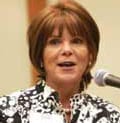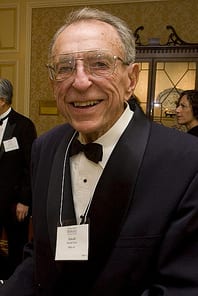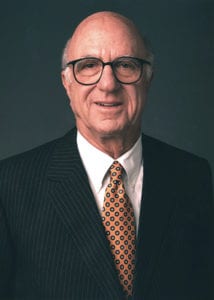 Former Barclays Global Invetors CEO Patricia Dunn, BA 75 (Journalism), a pioneer for women in business who served on the Haas Board for 11 years, passed away Sunday after a long battle against cancer. She was 58.
Former Barclays Global Invetors CEO Patricia Dunn, BA 75 (Journalism), a pioneer for women in business who served on the Haas Board for 11 years, passed away Sunday after a long battle against cancer. She was 58.
Dunn served on the Haas Board, which advises the dean, from 1999 to 2010 and the board of Hewlett-Packard from 1998 to 2006 after a successful investment banking career that included leading Barclays Global Investors (BGI) as its CEO from 1995 to 2002.
Dunn’s connection to the Haas School came through her husband, Haas alumnus William Jahnke, MBA 69, a former CEO of Wells Fargo Investment Advisers, where he and Dunn met. In addition to serving on the Haas Board, Dunn annually sponsored a table at the Haas Gala and was a major sponsor of the Haaski Golf Tournament, which she also played. In addition, she was a sponsor of the Women in Leadership Dinner and spoke at various Haas events.
“Pattie Dunn was a generous champion of the Haas School and paved the way for women in business for our students and alumni,” said Dean Rich Lyons, BS 82. “Throughout all the challenges she faced, Pattie demonstrated her strength and worked passionately on the causes that she believed in.”
Haas Lecturer and alumnus Steve Etter, BS 83, MBA 89, a partner with Greyrock Capital, echoed those sentiments. “She rose up the corporate ladder during a time when women were discriminated against openly,” said Etter, whose single mother was mentored by Dunn. Like Dunn, Etter’s mother rose from typist to successful corporate executive.
“Their two careers overlapped, and Pattie was a great role model and woman my mother looked up to and garnered strength from,” Etter recalled. “There is no doubt in my mind that Ms. Dunn made huge strides for women from her career advancement and management practices.”
Etter also witnessed firsthand Dunn’s philanthropic efforts at both Berkeley-Haas and the Larkin Street Youth Center in San Francisco, where she served as a member of the board of directors. “She was committed to making this world a better place through her tireless hours of donated time and her monetary contributions,” he said. “She went about her volunteer efforts in a very unassuming way and shared so much intellectual capital with any organization she came in contact with.”
After earning a journalism degree from UC Berkeley, Dunn landed a temporary secretarial job at Wells Fargo Investment Advisors, which was later acquired by Barclays Global Investors. She rose through BGI, one of the world’s largest asset managers, to eventually lead the company as CEO and chairman. Her many accomplishments at BGI included the launching in 2000 of iShares, a family of exchange-traded funds (ETFs) that now play a major role in the investment world and helped make ETFs mainstream.
Dunn made Fortune magazine’s “Power 50” List of America’s Top Women in 2000. She stepped down from Barclay’s in 2002 to fight breast cancer and melanoma, and then went out to fight ovarian cancer, according to press reports.
Dunn served on the HP board during her fight against cancer and held the chairmanship during a contentious time in the tech giant’s history, overseeing the ouster of CEO Carly Fiorina and the hiring of Mark Hurst of NCR Corp. to replace Fiorina.
During her watch as HP chair, the tech company hired private investigators to determine the source of leaks to the media. Dunn said she did not know about spying techniques used by the investigators, and she resigned from the board in 2006.
Dunn’s family is planning a memorial service in San Francisco. She is survived by her husband, Jahnke; three children; 10 grandchildren; and a brother and a sister.
 Harold Furst, BS 39 (Econ.), MBA 45, a Bay Area businessman, philanthropist, and one of the initial business advisers to rock promoter Bill Graham, passed away June 28 in Oakland. He was 94.
Harold Furst, BS 39 (Econ.), MBA 45, a Bay Area businessman, philanthropist, and one of the initial business advisers to rock promoter Bill Graham, passed away June 28 in Oakland. He was 94. Don Fisher, BS 51, chairman emeritus and founder of Gap Inc., passed away Sunday, Sept. 27, at the age of 81, following a long battle with cancer. Fisher was a long-time member of the Haas Board, which advises the dean on strategic and policy innovations, and recently served as the board’s chair.
Don Fisher, BS 51, chairman emeritus and founder of Gap Inc., passed away Sunday, Sept. 27, at the age of 81, following a long battle with cancer. Fisher was a long-time member of the Haas Board, which advises the dean on strategic and policy innovations, and recently served as the board’s chair.